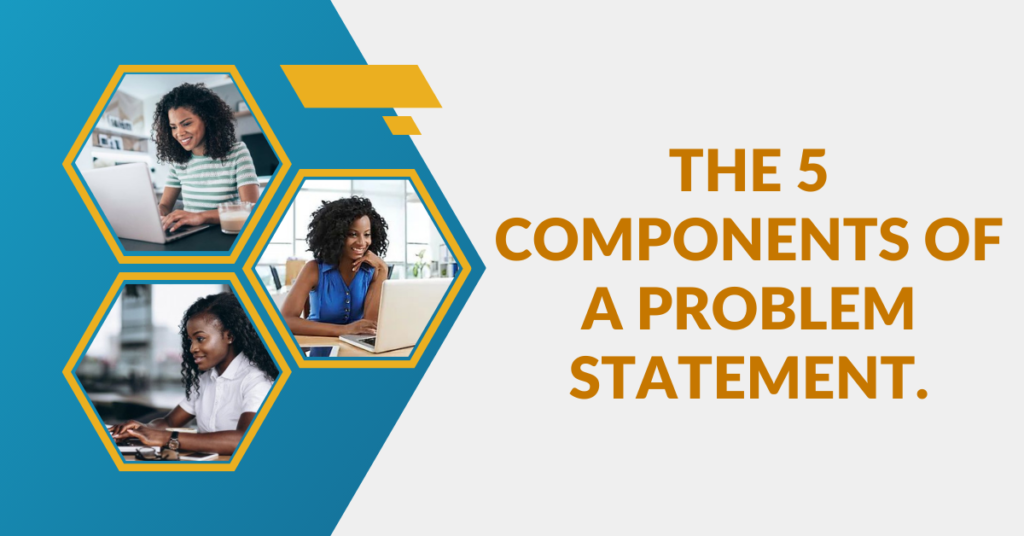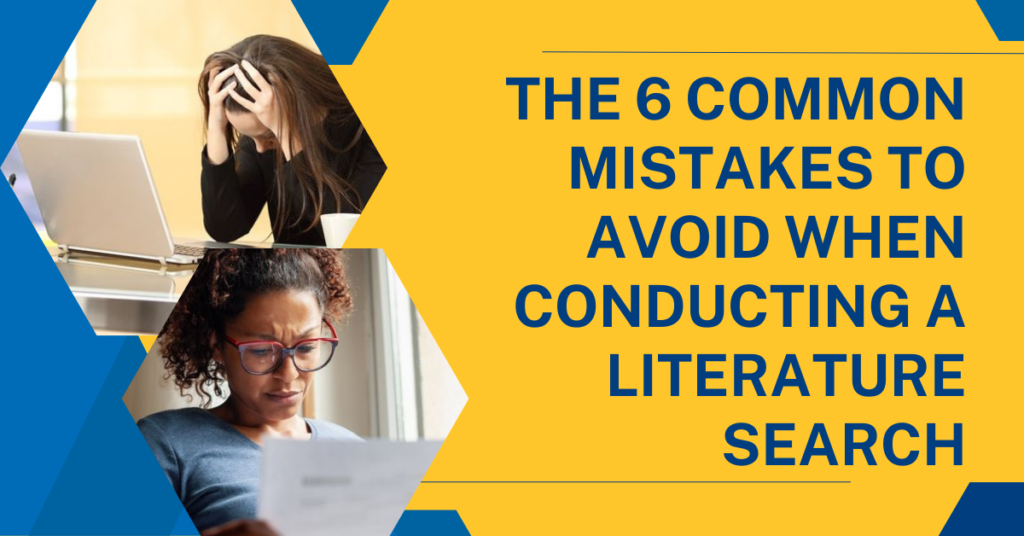 Menu
Facebook-f
Twitter
Google-plus-g
Menu
Facebook-f
Twitter
Google-plus-g
The 6 Common Mistakes to Avoid When Conducting A Literature Search

A thorough literature search is the backbone of any solid research project. It helps you understand the existing body of knowledge, identify gaps, and refine your research questions. However, conducting an effective literature search is not always straightforward, especially for new researchers. In this article, we’ll explore six common mistakes made during literature searches and offer practical tips on how to avoid them. Whether you’re a novice researcher or looking to sharpen your skills, this guide will help you conduct more efficient and comprehensive literature searches.
- Starting Without a Clear Research Question
One of the most common mistakes is beginning a literature search without a well-defined research question. Without a clear focus, you may find yourself overwhelmed by the vast amount of information available, leading to a scattered and ineffective search.
To fix this;
- Define Your Research Question: Before starting your literature search, take the time to formulate a clear and specific research question. This question will guide your search strategy and help you identify the most relevant sources.
- Break Down Your Topic: If your research question is broad, break it down into smaller, more specific sub-questions. This will help you focus on different aspects of the topic and make your search more manageable.
- Use Concept Maps: Create a concept map to visually organize your ideas and identify the key concepts related to your research question. This can help you stay focused during your search.
- Using Ineffective or Too Broad Keywords
Choosing the wrong keywords or using keywords that are too broad is a common mistake that can lead to irrelevant or overwhelming search results. Conversely, using overly specific keywords can result in too few results, missing important literature.
Solution:
- Refine Your Keywords: Start with broad keywords and then narrow them down by adding specific terms related to your research question. For example, instead of searching for “education,” you might search for “digital learning in higher education.”
- Use Boolean Operators: Learn to use Boolean operators (AND, OR, NOT) to refine your search. For example, “digital learning AND higher education” will return results that include both terms, while “digital learning OR e-learning” will return results for either term.
- Use Controlled Vocabulary: Some databases use controlled vocabulary (e.g., MeSH terms in PubMed) to index articles. Familiarize yourself with these terms to improve the accuracy of your search results.
- Not Reviewing the Reference Lists of Key Articles
Overlooking the reference lists of key articles is a missed opportunity to discover additional relevant literature. These reference lists can lead you to foundational studies and related research that you might not have found otherwise.
To fix this;
- Review References Thoroughly: After identifying key articles, review their reference lists to find additional sources. This can help you uncover seminal works or important studies that didn’t appear in your initial search.
- Use Citation Tracking Tools: Tools like Google Scholar and Scopus allow you to see how many times an article has been cited by others. This can help you identify influential studies and follow the development of a research topic over time.
- Conduct a Snowball Search: Start with a few key articles and use their references to find other relevant studies. Continue this process (snowballing) until you feel you have a comprehensive understanding of the literature.
- Failing to Evaluate the Quality of Sources
Not all sources are created equal. A common mistake is failing to critically evaluate the quality and credibility of the sources you find during your literature search. Including low-quality or irrelevant sources can weaken your research.
To avoid this,
- Assess Credibility: Evaluate the credibility of the sources by considering the author’s credentials, the journal’s reputation, and the date of publication. Peer-reviewed articles are generally more reliable than non-peer-reviewed ones.
- Check for Bias: Be aware of potential biases in the sources you include. For example, some studies may have been funded by organizations with a vested interest in the outcomes. Consider whether the source presents a balanced view of the topic.
- Use a Quality Checklist: Develop or use an existing checklist to evaluate the quality of the studies you include in your review. Criteria might include the study design, sample size, and the robustness of the analysis.
- Overlooking Grey Literature
Grey literature refers to research that is not formally published in peer-reviewed journals, such as conference papers, reports, theses, and government documents. Overlooking grey literature can result in a biased literature review, as it often contains valuable data and insights that are not available in traditional sources.
How to Avoid This Mistake:
- Include Grey Literature: Make a conscious effort to search for grey literature relevant to your topic. Sources can include institutional repositories, conference proceedings, government websites, and non-profit organizations.
- Use Specialized Databases: Databases like OpenGrey, ProQuest Dissertations & Theses, and Google Scholar can help you find grey literature. Be sure to evaluate the quality and credibility of these sources, as grey literature varies in reliability.
- Consult Guidelines: Some fields have specific guidelines for including grey literature in reviews, such as the Cochrane Handbook for systematic reviews. Follow these guidelines to ensure a comprehensive review.
- Not Keeping Track of Your Search Process
A disorganized search process can lead to confusion and missed opportunities. Failing to keep track of the databases searched, keywords used, and articles reviewed can make it difficult to replicate your search or explain your methodology.
How to Avoid This Mistake:
- Document Your Search Strategy: Keep a detailed record of your search process, including the databases used, search terms, filters applied, and the number of results obtained. This will make it easier to replicate your search or adjust it as needed.
- Use Reference Management Software: Tools like EndNote, Mendeley, or Zotero can help you organize your references and keep track of the articles you’ve reviewed. These tools also allow you to take notes and categorize your sources.
- Create a Search Log: Maintain a search log where you document your search process step by step. This log can include details like search dates, keywords, and any modifications made to your strategy.
Conclusion
A successful literature search is the foundation of any well-conducted research project. By avoiding these seven common mistakes—starting without a clear research question, relying too heavily on a single database, using ineffective keywords, not reviewing reference lists, failing to evaluate the quality of sources, overlooking grey literature, and not keeping track of your search process—you can ensure a more comprehensive and effective search.
Remember, conducting a literature search is an iterative process. Be prepared to refine your strategy as you go along and don’t hesitate to seek help or use tools to improve your efficiency. With careful planning and attention to detail, your literature search will provide a solid foundation for your research, helping you build on existing knowledge and contribute valuable insights to your field.
Further Reading
For those looking to improve their literature search skills, consider exploring the following resources:
- “The Literature Review: Six Steps to Success” by Lawrence A. Machi and Brenda T. McEvoy: A step-by-step guide to conducting a comprehensive literature review.
- “Systematic Approaches to a Successful Literature Review” by Andrew Booth, Diana Papaioannou, and Anthea Sutton: A detailed resource on different approaches to literature searching and reviewing.
- University Library Guides: Many university libraries offer online guides and tutorials on literature searching. These can be a valuable resource for learning about specific databases and search techniques.








Address List
- Makerere Hill Road, Ham Towers
- +256-703947778
- info@professionalwriters.shop
Social Networks
Links List
Professional Writers Inc.
Turning Ideas Into Reality
Online Academic Research Writing Training [Free]
JOIN NOW

